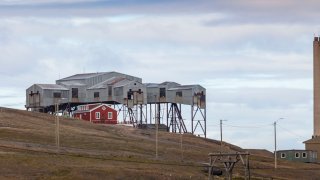Statistikk innhold
Statistics on
Research and development for all sectors
The statistics present total research and development (R&D) activities in Norway. It includes R&D performed in the business enterprise sector, the higher education sector and the institute sector, as well as separate tables for R&D in health trusts and international comparisons. The statistics include R&D expenditure, R&D personnel and R&D full-time equivalents.
Selected figures from these statistics
- R&D expenditure, R&D full-time equivalents (FTE) and R&D personnel, all sectors.Download table as ...R&D expenditure, R&D full-time equivalents (FTE) and R&D personnel, all sectors.
2024 2024 2024 Total R&D expenditure. Current prices (NOK million) Total R&D full-time equivalents (FTE) Total R&D personnel All sectors 93 542 52 434 .. Business enterprise sector 46 305 25 448 .. Institute sector 17 679 9 986 14 302 Higher education sector 29 559 17 000 41 012 2024 figures for the business enterprise sector and the higher education sector are preliminary. Final figures and more details for these sectors, will be published in February 2026. Explanation of symbolsDownload table as ...
About the statistics
The information under «About the statistics» was last updated 25 June 2025.
Research and experimental development (R&D) comprise creative and systematic work undertaken in order to increase the stock of knowledge – including knowledge of humankind, culture and society – and to devise new applications of available knowledge.
It can be difficult to distinguish R&D from other related activities. In the higher education sector, it is particularly challenging to draw the line between education, teaching, and specialized medical treatment, for example at university hospitals. Important criteria that must be met for the activity to be considered R&D are that it contains something new, is creative, has uncertainty related to the result, is systematic and can be transferred and / or reproduced.
Definition of the main variables
Type of R&D
- Basic research is experimental or theoretical work undertaken primarily to acquire new knowledge of the underlying foundations of phenomena and observable facts, without any particular application or use in view.
- Applied research is original investigation undertaken in order to acquire new knowledge. It is, however, directed primarily towards a specific, practical aim or objective.
- Experimental development is systematic work, drawing on knowledge gained from research and practical experience and producing additional knowledge, which is directed to producing new products or processes or to improving existing products or processes.
Sources of funding
- General university funds (higher education sector)
- Business enterprise sector
- Norwegian Research Council
- Ministries etc.
- Other national sources
- EU institutions
- Other sources from the rest of the world
R&D personnel
All personnel directly involved in research and development (R&D), both researchers and technical and other support staff.
R&D full-time equivalent (FTE)
The work performed by the R&D personnel during one year is converted into full-time equivalents.
Not relevant
Research and development for all sectors
Division for R&D, Technology and Business Dynamics Statistics (421)
National level, main variables by region and county
Statistics Norway conducts full surveys for the business enterprise sector and the institute sector annually and every two years for the higher education sector (odd-numbered years). Annual totals are prepared. R&D statistics for the higher education sector and the institute sector are published in October of the year following the end of the statistical year (t+10 months), while totals containing details for the business enterprise sector are published 14 months after the end of the statistical year (t+14 months).
Reporting to OECD and Eurostat
Statistics Norway stores collected and revised data securely, in accordance with applicable legislation on data processing.
Statistics Norway can grant access to the source data (de-identified or anonymised microdata) on which the statistics are based, for researchers and public authorities for the purposes of preparing statistical results and analyses. Access can be granted upon application and subject to conditions. See more about this at Access to data from Statistics Norway.
The purpose of the R&D surveys is to map the total national R&D activity that takes place in the business enterprise sector, the higher education sector and the institute sector.
The first R&D statistical surveys in Norway were conducted in the late 1950s. An important background was the Norwegian research councils' need for systematic information about research personnel, research recruitment needs and comparisons of investment in research between Norway and other countries. Norway, represented by the research councils of that time; the Norwegian Research Council for Science and the Humanities (NAVF), the Agricultural Scientific Research Council (NLVF) and the Royal Norwegian Council for Scientific and Industrial Research (NTNF), participated early in the work on developing R&D statistics in line with the OECD's initiative.
The other Nordic countries also participated early in the work, and over the years the Nordic countries have worked closely together on these statistics. 1963 is considered the year when international R&D statistics were established, and Norway has participated in the work from the beginning.
From the 1960s until 2022, the Nordic Institute for Studies in Innovation, Research and Education (NIFU) and its predecessors were responsible for conducting the R&D surveys for the institute sector and the higher education sector. Statistics Norway has had responsibility for conducting the R&D survey in the business enterprise sector since 1991. In 1993, the research councils were merged into the Research Council of Norway, and NIFU prepared R&D statistics for the higher education sector and the institute sector until 2022.
As of 2022, Statistics Norway conducts the R&D survey for all R&D performing sectors. The surveys and results are prepared according to guidelines made by the OECD in the so-called Frascati manual (oecd.org).
Key users are ministries, the Research Council of Norway, research environments, labour market organisations, media, researchers etc. The survey is an important part of the knowledge base for research policy, and is used in evaluation, research and analysis. OECD and Eurostat also use the results in international comparisons.
No external users have access to statistics before the statistics are published at 8 a.m. on ssb.no after at least three months' advance notice in the release calendar. This is one of the most important principles in Statistics Norway for ensuring equal treatment of users.
The national R&D figures equal the sum of the figures for the three sectors:
- Higher education sector
- Institute sector
- Business enterprise sector
We also present separate tables for R&D in the health trusts. R&D at university hospitals is also included in the higher education sector, and health trusts without university hospital functions and private, non-profit hospitals are part of the institute sector.
Statistics Norway reports R&D statistics for Norway to OECD and Eurostat, but with a somewhat different sector division internationally. The OECD's sector division consists of:
- Business enterprise sector
- Higher education sector
- Government sector and
- Private non-profit sector (PNP)
The business enterprise sector comprises the business enterprise sector, i.e. enterprises with at least 10 employees (5 employees for certain years). In addition, research institutes that mainly serve the business enterprise sector are included. These research institutes are part of the institute sector in the Norwegian sector division for R&D statistics.
The higher education sector corresponds to the national higher education sector.
The government sector comprises the part of the national institute sector that mainly serves the public sector, i.e. research institutes, other units with R&D, museums and health trusts without university hospital functions.
The PNP sector (private non-profit) performs little R&D in Norway and is therefore merged with the government sector in the R&D statistics. The same applies to the PNP sector in many other countries.
The statistics are developed, produced and disseminated pursuant to Act no. 32 of 21 June 2019 relating to official statistics and Statistics Norway (the Statistics Act).
Regulation (EU) 2019/2152 of the European Parliament and of the Council on European business statistics.
The R&D survey is a total survey for the higher education sector and the institute sector, while for the business enterprise sector it is a combination of census and sampling. Read more about the individual R&D performing sectors below, or in About the statistics for the individual statistics: Business enterprise sector, higher education sector and institute sector.
Business enterprise sector: In the business enterprise sector, some industries are not included, and for the industries that are included, it is a combination of census and probability sampling. There is a complete count of enterprises with at least 50 employees and probability sampling of enterprises with 10–49 employees. The R&D survey covers the entire business sector with certain exceptions. The following industry groups are included: NACE 03, 05–33, 35–39, 41–43, 46, 49–53, 58–66, 70–72, 74.9, 82.9 in the Standard Industrial Classification, SN2007.
- Manufacturing (C10-C33)
- Service industries: Wholesale and commission trade (G46), Transportation and storage (H49-H53), Information and communication (J58-J63), Financial and insurance activities (K64-K66), Professional, scientific and technical activities (M70-M72, M74.9), Administrative and support service activities (N82.9)
- Other industries: Fishing and aquaculture (A03), Mining and quarrying (B05-B09), Electricity supply (D35), Water supply, sewerage and waste management (E36-E39), Construction (F41-F43)
The R&D survey covers in principle enterprises with at least 10 employees, but every other year enterprises with 5–9 employees are also covered. Figures are published for total R&D with and without this group.
Enterprises with 5–9 employees were covered in the following years: 2006, 2008, 2010, 2012, 2015, 2017, 2019, 2021, 2022 and 2023.
Higher education sector: The R&D mapping of the higher education sector is a total survey of institutions with R&D activity of a certain scope:
- universities
- specialised state university colleges
- specialised private university colleges
- state university colleges
- art university colleges
- other university colleges
- university hospitals
Institute sector: The R&D mapping of the institute sector comprises research institutes subject to guidelines for government basic grants to research institutes and research groups (regjeringen.no), other research institutes and other units with a greater or lesser element of R&D in the public sector, and which are not classified in the business enterprise sector or in the higher education sector.
The institute sector is heterogeneous both in terms of size, purpose, academic orientation and in relation to which sectors of society the units serve. Health trusts without university hospital functions and private, non-profit hospitals are also included in the sector in the R&D statistics.
Health trusts: The data collection for the health trusts, or specialist health services, takes place through a separate survey to the health trusts. In the R&D statistics, R&D at health trusts with university hospital functions is included in the higher education sector, and health trusts without university hospital functions and private, non-profit hospitals are part of the institute sector. Here we also present R&D in the health trusts collectively.
For the business enterprise sector, the survey unit is the enterprise, but with breakdown of core variables by establishment (previously referred to as business). At educational institutions, the survey unit is the individual institute or basic unit. For university hospitals, the unit is the individual health trust. In the institute sector, it is the individual research institute, other units with R&D, health trusts without university hospital functions and private, non-profit hospitals.
The most important data sources for the R&D statistics are surveys to the survey units. For the higher education sector, administrative data are also included (accounting and personnel data). The survey measures expenditure on R&D, how the R&D activity is funded, as well as distributions adapted to the individual sector. The university hospitals are covered through a separate survey for health trusts (specialist health care services), which is compiled with the results for the educational institutions. The R&D survey also includes questions related to the government's prioritized theme and technology areas.
Editing
By editing we mean control, examination and amendment of data. There are several built-in controls in the electronic reporting. We conduct a receipt control for all forms, checking whether the questionnaire has been filled out and whether there are any obvious errors in the reported data. We then check the figures in more detail against administrative data (higher education sector), previous surveys and annual reports. Any errors, misunderstandings and deficiencies in the reporting are followed up with the respondent.
Calculations
For enterprises with less than 50 employees, the survey is based on a sample of enterprises. On the basis of these enterprises, totals are calculated for each stratum (industry and size group) for all variables (R&D costs, number of R&D full-time equivalents etc.).
For intermediate years (even-numbered years), Statistics Norway does not conduct a survey in the higher education sector. Instead, we calculate key figures based on information from the educational institutions collected via DBH/HK-dir, the institutions and the Research Council of Norway, as well as data from Statsbygg on expenditure on buildings and construction.
R&D activity at museums included in the institute sector is calculated based on the number of people in academic positions.
Fixed prices
Respondents report R&D expenditure in current prices, and Statistics Norway also publishes the figures for R&D expenditure in current prices. For total R&D expenditure, we also calculate figures in fixed prices. The deflator is based on the price index for production in the industry Professional, scientific and technical activities. You can find the figures in table 09170 in the statistics bank. In the field for statistical variable, select "Output at basic value. Annual change in prices (per cent)". In the field for industry, first select Industry (A38). Then select Research and development from the list below. This is a weighted cost index – an average index for the various types of expenditure. The same deflator is used for all the R&D performing sectors and it is updated in connection with the publication of new statistics.
Not relevant
Employees of Statistics Norway have a duty of confidentiality. Statistics Norway does not publish figures if there is a risk of the respondent's contribution being identified. This means that, as a general rule, figures are not published if fewer than three units form the basis of a cell in a table, or if the contribution of one or two respondents constitutes a very large part of the cell total.
Statistics Norway can make exceptions from the general rule if it follows from requirements for statistics in the EEA agreement, the respondent is a public authority, the respondent has consented, or when the information disclosed is openly accessible in society.
The results from the R&D statistics are published at an aggregated level so that individual institutes cannot be identified. Figures for smaller educational institutions are published collectively. Figures for R&D personnel are only published when there are at least 3 people behind each observation/indicator.
More information can be found in the 'Confidentiality' section on Statistics Norway's page on methods in official statistics.
Norway has participated in international cooperation on R&D statistics since its establishment in 1963 and also has R&D statistics from 1963 onwards. Over the years, there has been some variation in which sectors are mapped annually or every other year. Both organisational changes and changes in definitions and classifications mean that longer time series are not always equally meaningful for all sectors and all indicators. Some units have been merged into larger units, or have changed sector affiliation. See more about comparability over time in About the statistics for the individual sectors.
The R&D concept can be difficult to delimit from related activity. The quality of the data underlying the statistics depends on the judgment exercised by the persons answering the form, and on their knowledge of the R&D concept and the unit's R&D activities. Respondents receive guidance for completing the questionnaire with an overview of definitions. Furthermore, the quality is based on controls and routines at Statistics Norway that produce the R&D statistics, including through the design of questionnaires, contact with respondents in the various sectors, use of available administrative data and knowledge of the R&D system.
The response rate is high. If key R&D actors do not answer the questionnaire, the data are calculated based on other available information.
We publish preliminary figures for the R&D statistics approximately 10 months after the end of the statistical year, while final figures including detailed industry data are published 14 months after the end of the statistical year. At the same time, we update preliminary figures.
There have been no major revisions of the R&D statistics. See general principles for revision in Statistics Norway here.
See also the methodology appendix in "The Norwegian Research and Innovation System - Statistics and Indicators", The Indicator Report in Norwegian (forskningsradet.no).





